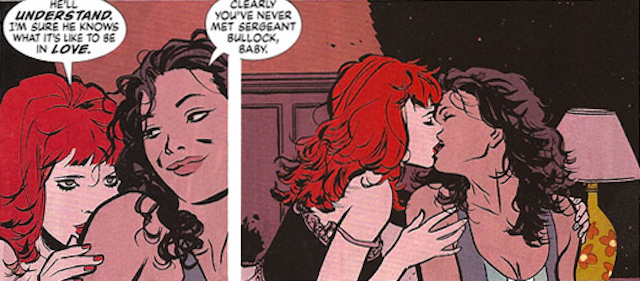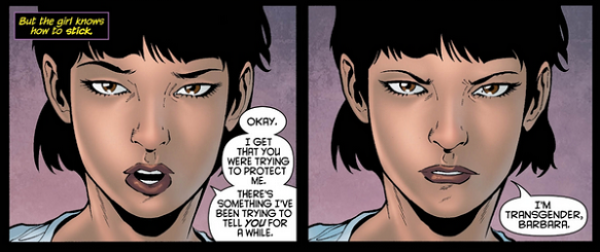DC Comics Is Receiving an Award for Their Depiction of LGBTQIA Characters, but There’s Still a Lot of Work to Do


The Gay, Lesbian, and Straight Entertainment Network (GLSEN) announced that they’re awarding this year’s Visionary Award to DC Comics, citing the publisher’s “commitment to showcasing diverse storylines.”
GLSEN is an organization dedicated to championing LGBTQIA students and causes in K–12 education. Their executive director, Eliza Bayard, explained the choice:
Superheroes hold an incredibly powerful place in our popular culture. Equally powerful is for LGBTQ youth to see themselves in our world, and DC enables just that. DC’s commitment to representing LGBTQ characters in all forms of media is both incredibly important and empowering.
GLSEN highlighted “Batwoman as the first lesbian super hero as a comic lead and [Batgirl’s best friend] Alysia Yeoh as the first trans character” in lauding DC’s accomplishments in this area. It’s great to see these characters acknowledged and celebrated, and the president of DC Entertainment and president of Warner Bros. Consumer Products, Diane Nelson, will be accepting the award on behalf of the company.

“At DC, we are committed to telling stories that reflect and inspire our diverse audience and we look forward to celebrating with the LGBTQ students and activists from across the country,” Nelson said, which is a very nice sentiment to hear broadcast from the top, especially a mere four years after writers quit Batwoman after being told to scrap several storylines, including a marriage between heroine Kate Kane and her girlfriend Maggie. (At the time, DC’s line was that no one in their universe should be happily wed, which, well, hmm.)
Comics have long been at the vanguard of social issues, and diverse LGBTQIA representation therein is growing. It’s a “trend” that I believe will continue apace until it no longer is a trend or a unique feature of a character that needs to be talked about, but is accepted without commentary. However, for all of the progress made in print, we have to draw attention to the continued shocking dearth of LGBTQIA characters in superhero mass media, especially movies. DC has given us Alex Danvers and Sara Lance on the small screen, for example, but what are the chances we’ll see Diana Prince explore her bisexuality anytime soon?
DC and Marvel have crafted massive, multi-billion dollar complex universes where, at current, we haven’t seen a single nod to LGBTQIA superheroes—or even sidekicks—as a concept that could exist. Aliens, mutants, magic, and super powers are viable, but not characters with a lifestyle that might be questioned by middle America or the massive Chinese market.
In 2017, this should be an unacceptable state of affairs. And before someone in the comments starts breaking out the argument that these movies are not about romance, consider how often a milquetoast love interest is foisted on one of our heroes, and the audience is supposed to accept it without question, because Heterosexuality.
Marvel is, in some cases, even worse in this regard, shoehorning in unearned romance (Black Widow/Hulk, anyone?) and seeming to do everything they can to shut down speculation on-screen about characters many fans prefer to see coded as queer. After Civil War came out, Vanity Fair observed:
…doesn’t Captain America: Civil War go out of its way to “define” Bucky and Steve’s relationship when Cap smooches Sharon Carter (Emily VanCamp) while Bucky looks on approvingly? Where’s the room for interpretation in that moment? And, leaving aside the vague creepiness of Steve making a move on Peggy’s (very willing) niece, the moment itself wasn’t necessary to the flow of the movie at all.
This hasn’t been a good time for LGBTQIA characters in big movies, period. We get winks and nods and passing glances and nothing else—take the recent cases of Beauty and the Beast, Power Rangers, and Star Trek: Into Darkness, whose “LGBTQIA” characters received a ton of headlines and buzz but little actual acknowledgment. Blink and you miss their LGBTQIA characterization entirely. There’s still a very, very long way to go, and we can never stop pushing the studios to be better and braver. As comics demonstrate, representation across many spectrums is vitally important.
With the recent mainstream success of LGBTQIA stories like Moonlight and “San Junipero,” part of me wants to believe that the studios will start making visible strides forward, if only as a cynical money grab, which is how much of showbusiness operates. “What is it the millennials are into these days?” I imagine some wizened old man smoking a cigar asking a Hollywood executive boardroom. “The gays? The superheroes? Get me a treatment.”
For the sake of the kids growing up who might now have a greater chance of seeing themselves reflected on screen, let’s hope this is the case. But I’m not holding my breath.
(via THR, image: DC Comics)
Want more stories like this? Become a subscriber and support the site!
—The Mary Sue has a strict comment policy that forbids, but is not limited to, personal insults toward anyone, hate speech, and trolling.—
Have a tip we should know? [email protected]
